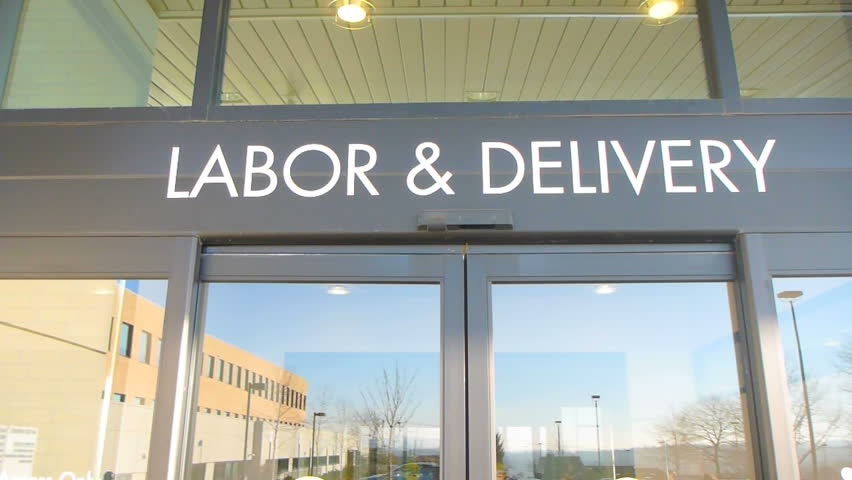I have been blessed to have given birth to four beautiful children. I have been blessed with a variety of different labors ranging in style, duration, and intensity. I have especially been blessed to have had my mother (who has been a doula for over 35 years) as my labor coach each time.
Labor is exactly what it sounds like; it’s difficult and painful. But one is lifted and carried by the knowledge that it will end with something good, something joyful. That knowledge doesn’t take away the pain, but it does serve to make the pain tolerable, because it is not the end, but a means to an end.
In preparation for labor and delivery my mother taught me how to recognize contractions, what to expect from them, how to “ride” each one, and how it is important to gather energy during the quiet time in between them to prepare for the next one.
Focal point is very important. A point on a wall, on a picture, or a number on a clock, a dot on a ceiling…something that does not move. Stare at it.
Breathing is possibly even more important. As the contraction is starting, inhale a deep cleansing breath, short breaths through the contraction, and as it comes down, another deep cleansing breath.
Visualization is difficult but essential. Visualize the baby one has yet to meet. Focus on the beauty of what is about to be.
I found that the trick was to use all three techniques from the moment the contraction started, because if I didn’t catch it from the first second, it overtook me, and I was not able to regain my control. It took every ounce of energy and focus, physical and emotional, to ride those contractions and remain in control. It also took my husband, my mother, and my midwife, reminding me, and guiding me. Through most of the contractions I focused and maintained my control.
With my fourth labor I threw in a new technique, niggun (song). I asked my husband to sing niggunim the whole time. He sang me through the car ride, the contractions, the quiet in between, the more intense contractions. It was beautiful and I am grateful to him. (And now my son Aryeh just happens to love niggunim.) At some point the contractions were so close together they almost overlapped. There was no time in between to gather strength. That’s when I knew that the baby I carried for nine months, nourished, kept warm, was about to be born. That’s how I got through those last few contractions, by focusing on the joy that was about to be.
There are times I have imagined that life is like labor. “Painful contractions” come and go and the trick is to just breathe through them and maintain control until they pass, while using the interim to gather emotional, spiritual, and physical strength before another one comes.
Recently I started a new labor. It was different than the others because it was backwards. It did not start slow and build up. It began with pain so intense and so deep, I felt it run through me in a deeper way than I thought pain could be ever be felt. The first “contraction” was so excruciating, so agonizing… it didn’t stop, and there was no release. I was not trained for this; this was not how it was supposed to happen. I couldn’t do anything but let it take me over. My body, my mind, my soul, all were overtaken by the pain. No breathing, no focal point, just endless pain.
Parents are supposed to welcome their children in to this world. As for the next world, our children are not supposed to get there before us. We are to greet them there, not say good-bye here. This is not how it was meant to be; this is all backwards.
That first contraction lasted for days.
People tried to make it more bearable – my mother, my father, my brother, my daughter, my sons, my friends – but it didn’t stop the pain, the horrible blinding pain. I looked around for my husband, as surely he could help me… but I saw his eyes, and it hit me with a wave of nauseous disbelief. He was having the contraction, too. The same excruciating pain I was also experiencing was ripping through him. It made no sense. I could see him barely breathing and it scared me. I had never seen him in this much agony. But I knew at that instant that he was the only one in the world who truly knew my pain.
I couldn’t rely on my husband to sing me through it this time. How could I possibly expect that from him when he was broken, too. But then he did. He sang to me, he talked to me, he did his best, through his own tears. We got through our first contraction together.
It seemed only minutes before the next one started, another wave of immense pain.
Not the kind of pain a mother should have to endure, nor a father. I wouldn’t let this one overtake me. I had to try to survive, maintain control, breath, focus – on anything. I focused on the sweet innocent toddler whose smile makes pain melt away. I focused on my daughter who was wishing so hard that her mother would stop crying. I focused on the son who quietly wanted answers but was too afraid to ask, too confused to cry. They were in pain, too, and they needed love. So I focused on that love. Visualize. What? The end? Isn’t this the end? Can there possibly be beauty or joy to come from this? This is blackness; this is not how it is supposed to happen. But then, I visualized warmth, light, G-dliness, Torah, holy laughter, pure joy.
Somehow, I survived that contraction and the ones after. I started to hear of other people who have had labors similar to mine, inexplicable, excruciating, unfathomable, backwards, and their husbands experienced it, too. They also thought they might not survive those first few contractions, that the pain was truly too much for a human being to bear. But they survived. No, they thrived. Their labor is still not over, but their contractions are farther apart now, a little less painful, at least on the outside. They have told me that they developed new techniques to ride them. They’ve come to accept this strange new labor, and understand that good that can be born from it. They have shared that joy can follow, that beauty can be possible once again.
I never know when they’ll come or how long they will last. They come in the car, in my kitchen, in the grocery store, in the park. When they come, I can’t always control how I act, or what I say, but I’ve come to understand that is okay, too. This is truly a strange labor. It is the opposite of everything I’ve learned and everything I understand. I focus on how grateful I am for what I have, how firmly I believe that even though I may never understand, there is only good in His plan.
For Mendel, I will survive. No, for Mendel I will thrive.
Eta C.– Mendel’s Mom









